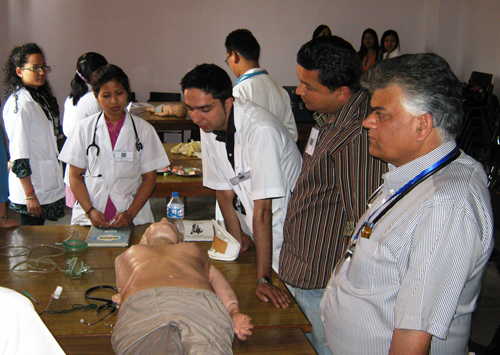
Before studying under Katrina, many of her students had not met a dying person. 'Doctors don’t tell their patients that they’re dying,' she says. 'They just tell them to keep taking the medicine until their life is almost over.'
To combat this, Katrina has started a palliative care course to educate medical students about end of life care and the best way to handle these situations. 'The family doesn’t tell their loved one either, so the patients are being lied to on two ends,' she says.
Through this module, Katrina’s students are learning how important it is to tell patients, who want to know, if they are dying and how withholding this information can affect the person in their care. 'It’s one thing to learn about it in class but it’s a totally different experience actually meeting somebody who doesn’t know their diagnosis and asks, ‘Do you know what’s wrong with me?’, and not being able to tell them.'
Katrina hopes that once her students become doctors, they will reflect on their experience and commit to honest and open relationships with their patients.
In another major project, Katrina is creating an instructional video to help doctors recertify in basic life support. Until recently, it was not mandatory for Nepali doctors to update their credentials, but after some discussion the Nepal Medical Council agreed that it was a good idea to do so every five years. By mid-April, construction of the three courses will be complete but until then, Katrina and her team are writing and translating scripts, finding producers and recruiting Nepali actors. 'It’s not something I’ve done before,' she says. 'But it’s fun.'
Yet another project Katrina is involved in is ‘rural rotation’. In June, 30 of her students will be working in clinics and medical centres outside of the capital for six months. Katrina is responsible for the study guide. She is collecting materials and other sources so that if there is no tutor, at least they will know where to get their information and what questions to ask. 'We say that we’re training doctors to work in rural Nepal, but if they only train and work in a big hospital in the city, we’re not really doing our jobs right.' This is a major part of the year where they gain the practical experience they need and get used to working in a much smaller setting.
Katrina is able to do this much needed work thanks, in part, to Baptist Insurance Company. Their continued support provides the funding she needs to enrich the minds of her students, save the lives of her patients and work with the government to make medical care in Nepal more accessible to everyone.